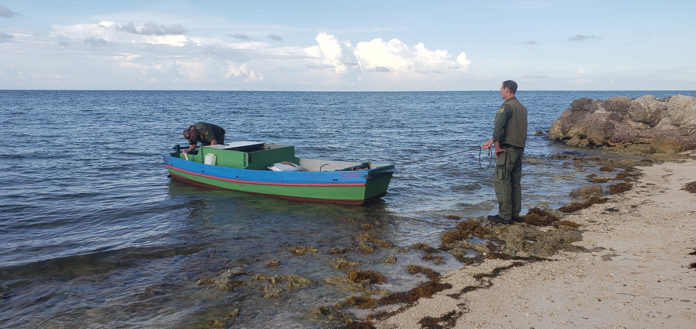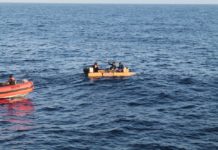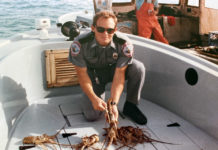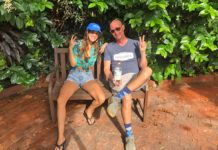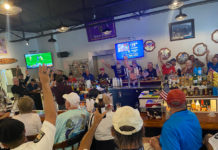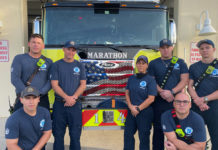They’re called “chugs” — homemade boats made by Cubans under the cover of darkness for a dangerous trip across the Florida Straits — because of the sound the crude engines make. Their construction, and the discarded items left behind, tell a nuanced story.
In the past month, Willie Guerra of the Monroe County Sheriff’s Office has found about a half dozen. He’s tasked with bringing them to shore. “Once the U.S. Coast Guard or Border Patrol finds the chugs, they remove the people and set the boat afloat. It becomes a navigational hazard,” Guerra said. “By the way, those are just the chugs we’ve found in the Middle Keys.”
On June 28, The Coast Guard found 11 Cubans in a rickety boat near Carysfort Reef (east of Key Largo).
It’s hard to know exactly how many Cubans are attempting to cross the Straits of Florida from that island nation to the Florida Keys. (Guerra estimates that more than 90% are intercepted before they reach land.) Some reach shore safely and slip into the South Florida population unnoticed; others drown at sea. On May 28, the U.S. Coast Guard reported it had saved eight lives, recovered the bodies of two drowned victims and were still looking for eight others before the search was suspended.
Since October, the Coast Guard has interdicted 512 Cubans to Cuba. The numbers are on the rise. That’s more than the number who were caught crossing the seas during the entire year of 2018 (259) and 2019 (313) and 10 times higher than those who crossed and were interdicted in 2020 (46).




A collection of “chugs” retrieved from Middle Keys waters in the past weeks. MCSO’s Willie Guerra is often tasked with removing the navigational hazards after their human cargo has been intercepted by federal agencies. CONTRIBUTED
Why?
They’re hungry.
In 2020, a survey by the Cuban Observatory for Human Rights (OCDH) revealed that 74% of Cuban families considered their diet deficient. This has two roots — restrictions by the U.S. government on remittances from U.S. residents to family members in Cuba, and the pandemic that knocked many of the same benefactors out of work. The pandemic also gutted international travel tourism, which the island nation relies on, and increased shipping costs. According to Reuters, Cuba traditionally imports by sea around 70% of the food it consumes.
Guerra said Cubans attempting a crossing on a “chug” are not reliant on the “coyotes,” or professional human smugglers. But twice in the past month, the Sheriff’s Office has stopped two boats being trailered south in the Keys that were loaded with supplies suggestive of a smuggling operation. On June 7, a pickup was towing a 29-foot Scarab boat loaded with more than 200 extra gallons of fuel in barrels in the bow, as well as 18 life jackets.
In the meantime, Guerra,and his federal counterparts will be watching the weather.
“The next good stretch of weather, the crossings will pick up again,” Guerra said. “They are risking everything, including their lives, to get here.”
The Coast Guard routinely warns against the dangers of unauthorized crossings. If Cubans are intercepted, they are held at an undisclosed location and returned in groups to the island nation.
















